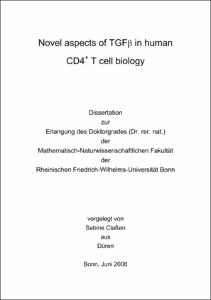Novel aspects of TGFβ in human CD4+ T cell biology

Novel aspects of TGFβ in human CD4+ T cell biology

| dc.contributor.advisor | Schultze, Joachim L. | |
| dc.contributor.author | Claßen, Sabine | |
| dc.date.accessioned | 2020-04-12T19:13:32Z | |
| dc.date.available | 2020-04-12T19:13:32Z | |
| dc.date.issued | 2008 | |
| dc.identifier.uri | https://hdl.handle.net/20.500.11811/3704 | |
| dc.description.abstract | During this thesis, several novel aspects of TGFß in human CD4+ T cell biology were investigated. First, we were interested, which factors control the resting state of CD4+ T cells. Genome-wide transcriptional analysis of serum-deprived CD4+ T cells revealed TGFß to be the most prominent factor controlling the homeostasis of CD4+ T cells. Furthermore, we could show that TGFß is especially important for the control of CD4+ T cell homeostasis in the presence of low-level T cell stimulating signals. The finding that TGFß is constantly signaling in human CD4+ T cells formed the basis for the investigation of the transcriptional changes in CD4+ T cells in response to clinical drug-mediated blockade of TGFß signaling. This analysis in combination with validation experiments resulted in the identification of three novel biomarker genes, which can be used to monitor the effectiveness of clinical drugs targeting TGFß signaling. Furthermore, we investigated the suppressive mechanisms of TGFß and Treg cells. We were able to demonstrate that the inhibitory potential of TGFß on human CD4+ T cells is independent of Treg cells. In contrast, Treg cell-mediated inhibition of CD4+ T cells is partially dependent on TGFß. In addition, we investigated the influence of TGFß on the induction of ‘induced’ human Treg cells derived from naïve T cells.In contrast to the murine system, we could induce suppressive FOXP3+ Treg cells via T cell activation (‘activation-induced’ Treg cells), independent of the presence of TGFß. The transcriptional profile of these ‘activation-induced’ Treg cells was related to natural Treg cells, when addressing the Treg-specific genes. In contrast to mere T cell activation, the addition of TGFß in the process of Treg cell induction (‘TGFß-induced’ Treg cells) led to changes in the expression of several transcription factors in comparison to activation-induced Treg cells. One gene downregulated in natural as well as TGFß-induced Treg cells but not in activation-induced Treg cells was the chromatin organizer SATB1. Therefore, regulation of this gene was investigated in more detail. T cell activation as well as TGFß were identified to be implicated in the regulation of SATB1. Taken together, during this thesis several new aspects of TGFß in the control of human CD4+ T cells homeostasis were demonstrated. This data formed the basis to develop biomarkers for clinical therapies targeting the TGFß signaling pathway. Moreover, some implications of TGFß on the biology of Treg cells were studied. | en |
| dc.language.iso | eng | |
| dc.rights | In Copyright | |
| dc.rights.uri | http://rightsstatements.org/vocab/InC/1.0/ | |
| dc.subject | Human | |
| dc.subject | T-Zelle | |
| dc.subject | TGFβ | |
| dc.subject | Biomarker | |
| dc.subject | SATB1 | |
| dc.subject | T cell | |
| dc.subject.ddc | 500 Naturwissenschaften | |
| dc.subject.ddc | 570 Biowissenschaften, Biologie | |
| dc.subject.ddc | 610 Medizin, Gesundheit | |
| dc.title | Novel aspects of TGFβ in human CD4+ T cell biology | |
| dc.type | Dissertation oder Habilitation | |
| dc.publisher.name | Universitäts- und Landesbibliothek Bonn | |
| dc.publisher.location | Bonn | |
| dc.rights.accessRights | openAccess | |
| dc.identifier.urn | https://nbn-resolving.org/urn:nbn:de:hbz:5N-15992 | |
| ulbbn.pubtype | Erstveröffentlichung | |
| ulbbnediss.affiliation.name | Rheinische Friedrich-Wilhelms-Universität Bonn | |
| ulbbnediss.affiliation.location | Bonn | |
| ulbbnediss.thesis.level | Dissertation | |
| ulbbnediss.dissID | 1599 | |
| ulbbnediss.date.accepted | 19.09.2008 | |
| ulbbnediss.fakultaet | Mathematisch-Naturwissenschaftliche Fakultät | |
| dc.contributor.coReferee | Kolanus, Waldemar |
Dateien zu dieser Ressource
Das Dokument erscheint in:
-
E-Dissertationen (4398)




